Bin Cui
pQuant: Towards Effective Low-Bit Language Models via Decoupled Linear Quantization-Aware Training
Feb 26, 2026Abstract:Quantization-Aware Training from scratch has emerged as a promising approach for building efficient large language models (LLMs) with extremely low-bit weights (sub 2-bit), which can offer substantial advantages for edge deployment. However, existing methods still fail to achieve satisfactory accuracy and scalability. In this work, we identify a parameter democratization effect as a key bottleneck: the sensitivity of all parameters becomes homogenized, severely limiting expressivity. To address this, we propose pQuant, a method that decouples parameters by splitting linear layers into two specialized branches: a dominant 1-bit branch for efficient computation and a compact high-precision branch dedicated to preserving the most sensitive parameters. Through tailored feature scaling, we explicitly guide the model to allocate sensitive parameters to the high-precision branch. Furthermore, we extend this branch into multiple, sparsely-activated experts, enabling efficient capacity scaling. Extensive experiments indicate our pQuant achieves state-of-the-art performance in extremely low-bit quantization.
BrowseComp-$V^3$: A Visual, Vertical, and Verifiable Benchmark for Multimodal Browsing Agents
Feb 13, 2026Abstract:Multimodal large language models (MLLMs), equipped with increasingly advanced planning and tool-use capabilities, are evolving into autonomous agents capable of performing multimodal web browsing and deep search in open-world environments. However, existing benchmarks for multimodal browsing remain limited in task complexity, evidence accessibility, and evaluation granularity, hindering comprehensive and reproducible assessments of deep search capabilities. To address these limitations, we introduce BrowseComp-$V^3$, a novel benchmark consisting of 300 carefully curated and challenging questions spanning diverse domains. The benchmark emphasizes deep, multi-level, and cross-modal multi-hop reasoning, where critical evidence is interleaved across textual and visual modalities within and across web pages. All supporting evidence is strictly required to be publicly searchable, ensuring fairness and reproducibility. Beyond final-answer accuracy, we incorporate an expert-validated, subgoal-driven process evaluation mechanism that enables fine-grained analysis of intermediate reasoning behaviors and systematic characterization of capability boundaries. In addition, we propose OmniSeeker, a unified multimodal browsing agent framework integrating diverse web search and visual perception tools. Comprehensive experiments demonstrate that even state-of-the-art models achieve only 36% accuracy on our benchmark, revealing critical bottlenecks in multimodal information integration and fine-grained perception. Our results highlight a fundamental gap between current model capabilities and robust multimodal deep search in real-world settings.
LAER-MoE: Load-Adaptive Expert Re-layout for Efficient Mixture-of-Experts Training
Feb 12, 2026Abstract:Expert parallelism is vital for effectively training Mixture-of-Experts (MoE) models, enabling different devices to host distinct experts, with each device processing different input data. However, during expert parallel training, dynamic routing results in significant load imbalance among experts: a handful of overloaded experts hinder overall iteration, emerging as a training bottleneck. In this paper, we introduce LAER-MoE, an efficient MoE training framework. The core of LAER-MoE is a novel parallel paradigm, Fully Sharded Expert Parallel (FSEP), which fully partitions each expert parameter by the number of devices and restores partial experts at expert granularity through All-to-All communication during training. This allows for flexible re-layout of expert parameters during training to enhance load balancing. In particular, we perform fine-grained scheduling of communication operations to minimize communication overhead. Additionally, we develop a load balancing planner to formulate re-layout strategies of experts and routing schemes for tokens during training. We perform experiments on an A100 cluster, and the results indicate that our system achieves up to 1.69x acceleration compared to the current state-of-the-art training systems. Source code available at https://github.com/PKU-DAIR/Hetu-Galvatron/tree/laer-moe.
CoFEH: LLM-driven Feature Engineering Empowered by Collaborative Bayesian Hyperparameter Optimization
Feb 10, 2026Abstract:Feature Engineering (FE) is pivotal in automated machine learning (AutoML) but remains a bottleneck for traditional methods, which treat it as a black-box search, operating within rigid, predefined search spaces and lacking domain awareness. While Large Language Models (LLMs) offer a promising alternative by leveraging semantic reasoning to generate unbounded operators, existing methods fail to construct free-form FE pipelines, remaining confined to isolated subtasks such as feature generation. Most importantly, they are rarely optimized jointly with hyperparameter optimization (HPO) of the ML model, leading to greedy "FE-then-HPO" workflows that cannot capture strong FE-HPO interactions. In this paper, we present CoFEH, a collaborative framework that interleaves LLM-based FE and Bayesian HPO for robust end-to-end AutoML. CoFEH uses an LLM-driven FE optimizer powered by Tree of Thought (ToT) to explore flexible FE pipelines, a Bayesian optimization (BO) module to solve HPO, and a dynamic optimizer selector that realizes interleaved optimization by adaptively scheduling FE and HPO steps. Crucially, we introduce a mutual conditioning mechanism that shares context between LLM and BO, enabling mutually informed decisions. Experiments show that CoFEH not only outperforms traditional and LLM-based FE baselines, but also achieves superior end-to-end performance under joint optimization.
ChartVerse: Scaling Chart Reasoning via Reliable Programmatic Synthesis from Scratch
Jan 20, 2026Abstract:Chart reasoning is a critical capability for Vision Language Models (VLMs). However, the development of open-source models is severely hindered by the lack of high-quality training data. Existing datasets suffer from a dual challenge: synthetic charts are often simplistic and repetitive, while the associated QA pairs are prone to hallucinations and lack the reasoning depth required for complex tasks. To bridge this gap, we propose ChartVerse, a scalable framework designed to synthesize complex charts and reliable reasoning data from scratch. (1) To address the bottleneck of simple patterns, we first introduce Rollout Posterior Entropy (RPE), a novel metric that quantifies chart complexity. Guided by RPE, we develop complexity-aware chart coder to autonomously synthesize diverse, high-complexity charts via executable programs. (2) To guarantee reasoning rigor, we develop truth-anchored inverse QA synthesis. Diverging from standard generation, we adopt an answer-first paradigm: we extract deterministic answers directly from the source code, generate questions conditional on these anchors, and enforce strict consistency verification. To further elevate difficulty and reasoning depth, we filter samples based on model fail-rate and distill high-quality Chain-of-Thought (CoT) reasoning. We curate ChartVerse-SFT-600K and ChartVerse-RL-40K using Qwen3-VL-30B-A3B-Thinking as the teacher. Experimental results demonstrate that ChartVerse-8B achieves state-of-the-art performance, notably surpassing its teacher and rivaling the stronger Qwen3-VL-32B-Thinking.
LB-MCTS: Synergizing Large Language Models and Bayesian Optimization for Efficient CASH
Jan 18, 2026Abstract:To lower the expertise barrier in machine learning, the AutoML community has focused on the CASH problem, a fundamental challenge that automates the process of algorithm selection and hyperparameter tuning. While traditional methods like Bayesian Optimization (BO) struggle with cold-start issues, Large Language Models (LLMs) can mitigate these via semantic priors. However, existing LLM-based optimizers generalize poorly to the high-dimensional, structured CASH space. We propose LB-MCTS, a framework synergizing LLMs and BO within a Monte Carlo Tree Search structure. It maximizes LLM reasoning with Selective Tuning Memory (STM) and explicit exploration-exploitation trade-off. It combines the strengths of both paradigms by dynamically shifting from LLM-driven to BO-driven proposals as data accumulates. Experiments on 104 AMLB datasets demonstrate the superiority of LB-MCTS over the competitive baselines.
Efficient Content-based Recommendation Model Training via Noise-aware Coreset Selection
Jan 15, 2026Abstract:Content-based recommendation systems (CRSs) utilize content features to predict user-item interactions, serving as essential tools for helping users navigate information-rich web services. However, ensuring the effectiveness of CRSs requires large-scale and even continuous model training to accommodate diverse user preferences, resulting in significant computational costs and resource demands. A promising approach to this challenge is coreset selection, which identifies a small but representative subset of data samples that preserves model quality while reducing training overhead. Yet, the selected coreset is vulnerable to the pervasive noise in user-item interactions, particularly when it is minimally sized. To this end, we propose Noise-aware Coreset Selection (NaCS), a specialized framework for CRSs. NaCS constructs coresets through submodular optimization based on training gradients, while simultaneously correcting noisy labels using a progressively trained model. Meanwhile, we refine the selected coreset by filtering out low-confidence samples through uncertainty quantification, thereby avoid training with unreliable interactions. Through extensive experiments, we show that NaCS produces higher-quality coresets for CRSs while achieving better efficiency than existing coreset selection techniques. Notably, NaCS recovers 93-95\% of full-dataset training performance using merely 1\% of the training data. The source code is available at \href{https://github.com/chenxing1999/nacs}{https://github.com/chenxing1999/nacs}.
DataFlow: An LLM-Driven Framework for Unified Data Preparation and Workflow Automation in the Era of Data-Centric AI
Dec 18, 2025Abstract:The rapidly growing demand for high-quality data in Large Language Models (LLMs) has intensified the need for scalable, reliable, and semantically rich data preparation pipelines. However, current practices remain dominated by ad-hoc scripts and loosely specified workflows, which lack principled abstractions, hinder reproducibility, and offer limited support for model-in-the-loop data generation. To address these challenges, we present DataFlow, a unified and extensible LLM-driven data preparation framework. DataFlow is designed with system-level abstractions that enable modular, reusable, and composable data transformations, and provides a PyTorch-style pipeline construction API for building debuggable and optimizable dataflows. The framework consists of nearly 200 reusable operators and six domain-general pipelines spanning text, mathematical reasoning, code, Text-to-SQL, agentic RAG, and large-scale knowledge extraction. To further improve usability, we introduce DataFlow-Agent, which automatically translates natural-language specifications into executable pipelines via operator synthesis, pipeline planning, and iterative verification. Across six representative use cases, DataFlow consistently improves downstream LLM performance. Our math, code, and text pipelines outperform curated human datasets and specialized synthetic baselines, achieving up to +3\% execution accuracy in Text-to-SQL over SynSQL, +7\% average improvements on code benchmarks, and 1--3 point gains on MATH, GSM8K, and AIME. Moreover, a unified 10K-sample dataset produced by DataFlow enables base models to surpass counterparts trained on 1M Infinity-Instruct data. These results demonstrate that DataFlow provides a practical and high-performance substrate for reliable, reproducible, and scalable LLM data preparation, and establishes a system-level foundation for future data-centric AI development.
BRACE: A Benchmark for Robust Audio Caption Quality Evaluation
Dec 11, 2025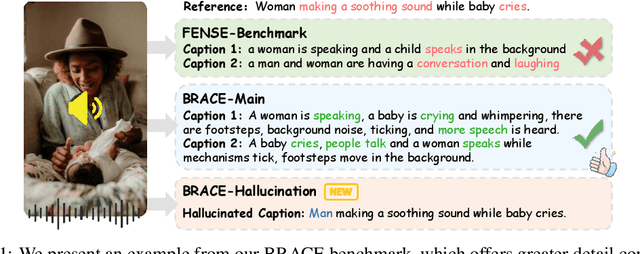
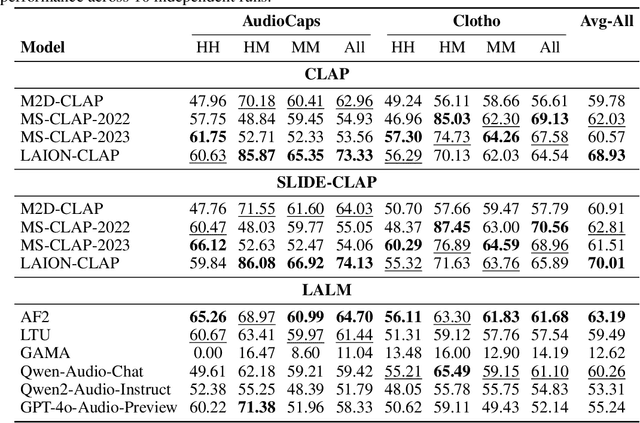
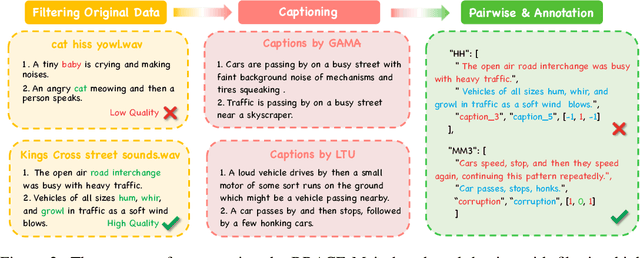
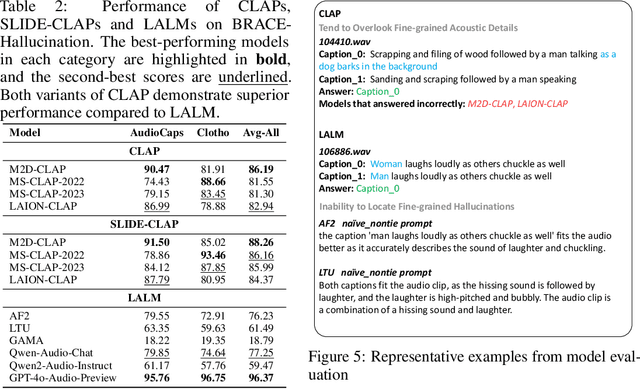
Abstract:Automatic audio captioning is essential for audio understanding, enabling applications such as accessibility and content indexing. However, evaluating the quality of audio captions remains a major challenge, especially in reference-free settings where high-quality ground-truth captions are unavailable. While CLAPScore is currently the most widely used reference-free Audio Caption Evaluation Metric(ACEM), its robustness under diverse conditions has not been systematically validated. To address this gap, we introduce BRACE, a new benchmark designed to evaluate audio caption alignment quality in a reference-free setting. BRACE is primarily designed for assessing ACEMs, and can also be extended to measure the modality alignment abilities of Large Audio Language Model(LALM). BRACE consists of two sub-benchmarks: BRACE-Main for fine-grained caption comparison and BRACE-Hallucination for detecting subtle hallucinated content. We construct these datasets through high-quality filtering, LLM-based corruption, and human annotation. Given the widespread adoption of CLAPScore as a reference-free ACEM and the increasing application of LALMs in audio-language tasks, we evaluate both approaches using the BRACE benchmark, testing CLAPScore across various CLAP model variants and assessing multiple LALMs. Notably, even the best-performing CLAP-based ACEM achieves only a 70.01 F1-score on the BRACE-Main benchmark, while the best LALM reaches just 63.19. By revealing the limitations of CLAP models and LALMs, our BRACE benchmark offers valuable insights into the direction of future research.
AutoLugano: A Deep Learning Framework for Fully Automated Lymphoma Segmentation and Lugano Staging on FDG-PET/CT
Dec 08, 2025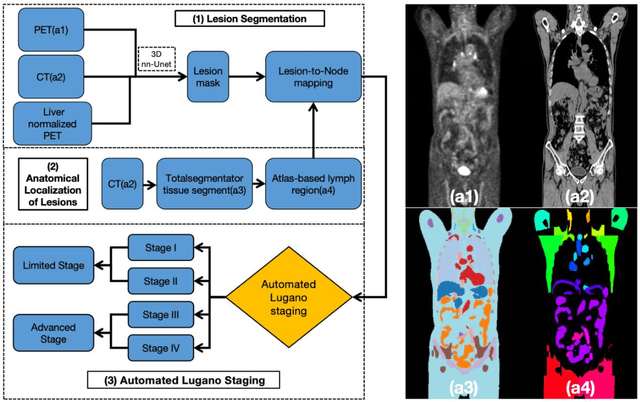
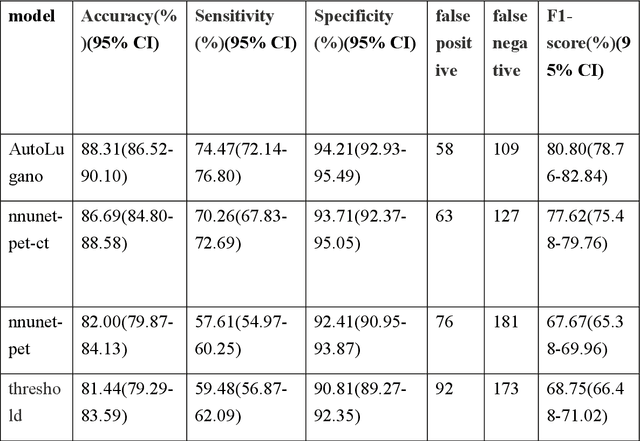
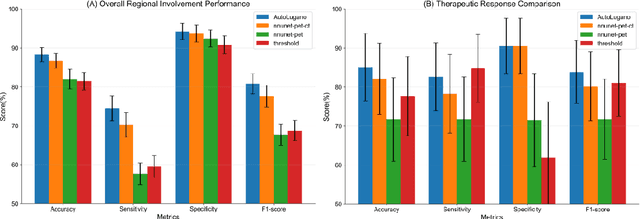
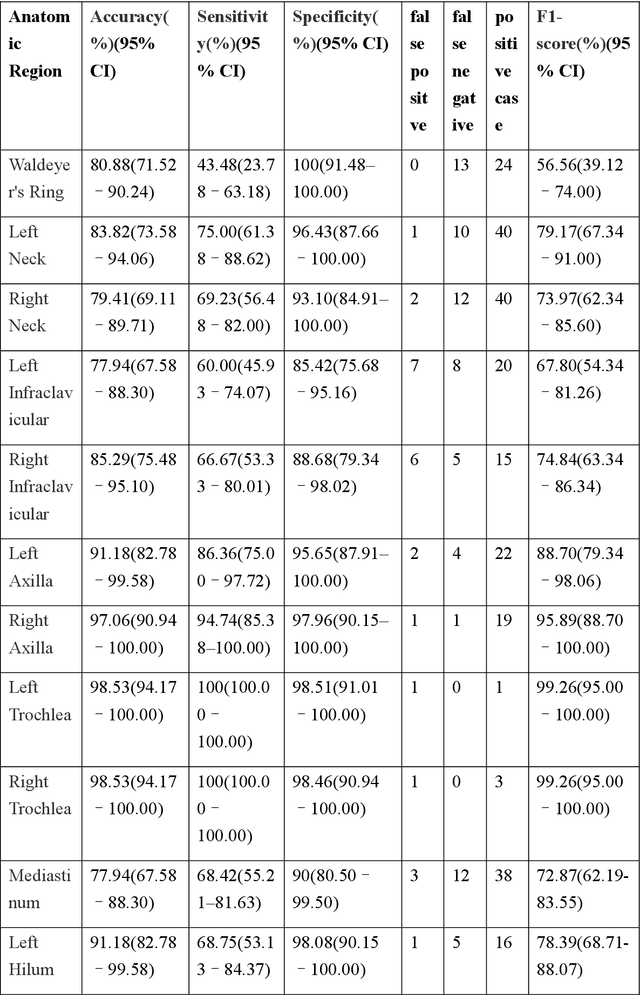
Abstract:Purpose: To develop a fully automated deep learning system, AutoLugano, for end-to-end lymphoma classification by performing lesion segmentation, anatomical localization, and automated Lugano staging from baseline FDG-PET/CT scans. Methods: The AutoLugano system processes baseline FDG-PET/CT scans through three sequential modules:(1) Anatomy-Informed Lesion Segmentation, a 3D nnU-Net model, trained on multi-channel inputs, performs automated lesion detection (2) Atlas-based Anatomical Localization, which leverages the TotalSegmentator toolkit to map segmented lesions to 21 predefined lymph node regions using deterministic anatomical rules; and (3) Automated Lugano Staging, where the spatial distribution of involved regions is translated into Lugano stages and therapeutic groups (Limited vs. Advanced Stage).The system was trained on the public autoPET dataset (n=1,007) and externally validated on an independent cohort of 67 patients. Performance was assessed using accuracy, sensitivity, specificity, F1-scorefor regional involvement detection and staging agreement. Results: On the external validation set, the proposed model demonstrated robust performance, achieving an overall accuracy of 88.31%, sensitivity of 74.47%, Specificity of 94.21% and an F1-score of 80.80% for regional involvement detection,outperforming baseline models. Most notably, for the critical clinical task of therapeutic stratification (Limited vs. Advanced Stage), the system achieved a high accuracy of 85.07%, with a specificity of 90.48% and a sensitivity of 82.61%.Conclusion: AutoLugano represents the first fully automated, end-to-end pipeline that translates a single baseline FDG-PET/CT scan into a complete Lugano stage. This study demonstrates its strong potential to assist in initial staging, treatment stratification, and supporting clinical decision-making.
 Add to Chrome
Add to Chrome Add to Firefox
Add to Firefox Add to Edge
Add to Edge